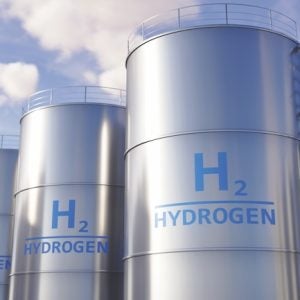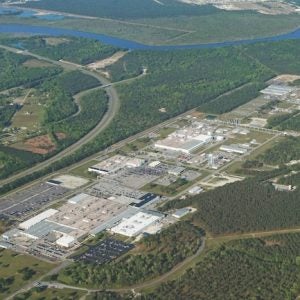
TURKEY HAS STARTED GENERAL construction work at Akkuyu, the site of its first nuclear power plant in Mersin province on the Mediterranean coast. Four 1200MW VVER-1200 reactors are being built at the site, financed by Russia under a build-own-operate model. First nuclear concrete is slated for 2018.
The project has an ambitious schedule. Akkuyu 1 is targeted to start on 29 October 2023 – the centenary of the founding of the Republic of Turkey. The other three units are due to connect at yearly intervals, with the plant fully operational by the end of 2026. The facility will be owned and operated by Akkuyu Nuclear AS, a joint venture led by Rusatom Energy International.
AAEM Turbine technology, a joint venture between Rosatom’s Atomenergomash (AEM) and General Electric (GE) has been contracted to design and supply the equipment and systems for the conventional islands.
The contract was signed in August 2017, and procurement activities are already underway.
Michael Keroullé, chief commercial officer for steam power systems at GE Power, said “We are full steam into signing the engineering contracts and pre-order of critical equipment.”
The turbines are due to be delivered in 2021-2024.
GE Steam Power Systems will deliver four turbine generator sets including the ArabelleTM half-speed steam turbine, Gigatop 4-poles generator and condenser vacuum equipment. GE will also provide full design cycle for its scope of supply and basic design services for AAEM’s scope.
In addition to supplying reactor equipment, AEM will manufacture the moisture separator reheater, condenser and heaters. GE said it has transferred design experience on these components to AEM through the JV. In September, AEM was approved by the Turkish Atomic Energy Authority as a manufacturer of equipment for Akkuyu. TAEK reviewed documentation submitted by AEM and carried out audits at its Volgodonsk and Petrozavodsk production plants, reviewing facilities, production processes, quality inspection and safety culture.
Technology
GE steam turbine technology operates in half of the world’s nuclear power plants – 200GW of installed capacity. The Arabelle technology was pioneered by Alstom in France and GE acquired Alstom’s energy business in 2015.
Arabelle has been the largest turbine in operation for the past decade, producing 2% more power output than a traditional configuration. It has a 99.96% reliability rate based on over 400,000 operating hours.
Unique among large nuclear steam turbines, the ArabelleTM has single-flow high pressure (HP) and intermediate pressure (IP) sections, in a combined HP/IP casing to reduce overall length. Incoming steam expands in the single flow HP section and is then fed to the moisture separator reheaters (MSRs), where it is superheated in two stages. The superheated steam is then expanded in the single flow IP cylinder of the turbine.
Welded rotor technology (rather than shrunk-on discs or monobloc rotors) is a key feature of the ArabelleTM. It allows better control of material properties and gives better resistance to stress corrosion cracking. Also, with welded rotor technology, the forgings are relatively small and can be provided by qualified vendors around the world, which means that sourcing and delivery of components is easier and more secure.
The design can be used in any reactor with minor changes. The modular construction means the turbine can be connected to any condensation, and fitted with two to four low-pressure modules and last stage blades of three different sizes. It comes in capacities between 1000MW to 1900MW and can operate at both 60Hz and 50Hz.
The accompanying Gigatop 4-pole hydrogen- and water-cooled generator is also very efficient. Using hydrogen as the cooling fluid significantly reduces the ventilation and friction losses, delivering efficiency of 99%. The generator design has been developed up to 2000MVA.
Projects
Now in its tenth year, the AAEM joint-venture was awarded its first contract, for the Baltic nuclear power plant in Kaliningrad, in February 2012. The €875 million contract includes supply of Arabelle turbines, generators, condensers, moisture separator reheaters and auxiliary equipment, with 50% of the components expected to be manufactured in Russia. The project has been suspended, although Andreas Lusch, president and CEO of GE Steam Power Systems, says that some of the turbine island equipment has already been manufactured. “We are waiting for the Russian government to decide if they want to continue the project,” Lusch says. But he notes that the contract helped with staffing the JV and equipment production. This experience stands AAEM in good stead for the Akkuyu and Hanhikivi contracts won in 2017.
“The contract for the turbines and auxiliary systems for the Akkuyu nuclear power plant is an important milestone in the joint venture development,” notes Andrei Nikipelov, CEO of Atomenergomash. The Turkish order comes on the heels of a deal signed with Fennovoima for delivery of the turbine generator set for Hanhikivi 1 this summer. GE will deliver a high-pressure turbine, intermediate pressure turbine, three low-pressure turbines and a Gigatop 4 generator. The equipment, almost 80m in length, weighs about 2500t. As for Akkuyu, the components will be manufactured in France at GE’s Belfort facility.
Fennovoima applied to the Finnish government for the Hanhikivi 1 construction licence in June 2015 and hoped to start construction in 2018, with the plant expected to startup around 2024. However, in September Fennovoima revealed it is now expecting to receive the licence in 2019, a year later than previously envisaged.
Lusch told NEI that GE is aware of the delay and is helping to provide documentation needed for the licensing process, but that the schedule is being managed by Rosatom. Keroullé added that provisions are in place for delays, noting that in the main scope of work the engineering and delivery are in phase I of the project, with installation often carried out by the EPC contractor building the plant.
GE has also proposed its half-speed Arabelle turbine for Paks II in Hungary. The competition is under way in line with European procurement rules, and Rosatom had been aiming for selection by the end of 2017.
Arabelle turbines are heading to the UK’s Hinkley Point C project in Somerset, UK, as part of a $1.9bn deal for turbines, generators and other equipment for the UK’s flagship project.
Looking more generally, GE sees nuclear as an important part of its future pipeline. “Our view is that there is going to be 150GW of new nuclear plants built in the next 20 years, including in India and China,” says Keroullé. “Some of this will be open to international suppliers…We see [nuclear] as a significant part of the business going forward.”






